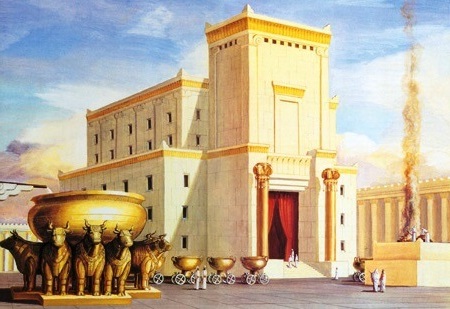
Why did God command that we offer korbanot (sacrifices)? What is the purpose of this form of serving God?
Maimonides’ Explanation
Much has been written about Maimonides’ controversial analysis of the Temple service in his Guide for the Perplexed. At the core of Maimonides’ explanation is his recognition of the difficulty in changing human nature. Deeply entrenched habits and beliefs cannot be uprooted overnight. It would have been futile for the Torah to command the Israelite slaves to abruptly discontinue all forms of worship which they had known in Egypt. Such a revolutionary demand would be like a present-day religious leader demanding that we suspend all external displays of worshipping God — no fasts and festivals, no prayers and petitions in times of trouble — just a mental service of God through reflection and meditation, without action or speech.
For this reason, the Torah permitted forms of worship that were practiced in those times. However, the Torah required that all worship be directed toward God alone. In this way, the nation would be weaned from idolatry, without being stripped of those practices they used to express themselves spiritually.
“It is unreasonable to expect that one who grew up as a slave, laboring in mud and bricks, should one day wash his hands from the dirt and straight off [without any preparation] do battle with the giants. Therefore, God did not immediately bring the people into the Land of Israel, and did not lead them [along the direct route], ‘the way of the Land of the Philistines’ (Ex. 13:17). Similarly, it is unnatural for one who is accustomed to many forms of service and practices, so ingrained that they are like unquestionable laws, to abruptly desist from them.” (Guide III,32)
Nachmanides Objects
Other medieval scholars rejected Maimonides’ approach out of hand. Nachmanides (on Lev. 1:9) in particular vociferously attacked this position. He refuted Maimonides’ explanation with two major arguments:
To Reform a Prince
And yet it appears that we find support for Maimonides’ explanation in the Midrash. The Midrash explains the purpose of korbanot by way of a parable:
“This is like an uncouth prince who was given to devouring unslaughtered meat. The king said: ‘Let him always be at my table, and he will be reformed on his own.’ So too, since the Israelites were keenly devoted to idolatry in Egypt... the Holy One said: Let them offer their sacrifices before Me at all times.” (Vayikra Rabbah 22:8)
A careful reading of the Midrash, however, indicates an approach quite different than that of Maimonides. The parable speaks of the prince eating all of his meals at the king’s table. Clearly, dining with the king is in itself a great privilege and honor, besides its secondary benefit as a means to reform the prince’s coarse habits.
The parable is describing a situation where the son, due to his inappropriate behavior, does not deserve to dine with the king. Dining with the king is certainly a great honor, but eating exclusively at the royal table is a special measure designed to refine the prince’s behavior. So too, offering korbanot is a lofty form of worshipping God. Through this service, we merit a spiritual elevation, like one who dines with the King Himself, gaining the special favor of the King of the universe.
This parable does not come to explain the concept of korbanot in general, but rather refers to a temporary edict that was in force only while the Israelites sojourned in the desert. For those 40 years, they were forbidden to slaughter meat for their own personal consumption. They were only allowed to eat from the Shelamim (Peace offerings) brought to the Tabernacle (see Deut. 12:20). The Midrash explains that this provisional decree was meant to wean the recently liberated slaves away from idolatrous practices, ensuring that none would continue the idolatrous practices of Egypt in the privacy of his home.
Jeremiah’s Clarification
This may be the true meaning of the verse which Maimonides quoted as a source text:
“For I did not speak with your fathers, nor did I command them when I took them out of Egypt, regarding offerings and sacrifices” (Jeremiah 7:22).
This verse is problematic. How could Jeremiah claim that the Torah does not command us to offer korbanot? We find many chapters in Leviticus devoted to the Temple service. And why does the verse stress, “When I took them out of Egypt”?
The verse cannot be referring to those offerings which are explicitly commanded in the Torah. Rather, it refers to the special situation that existed “when I took them out of the Land of Egypt,” when meat was permitted only when brought as a Shelamim offering in the Tabernacle. One might think that this is the ideal, and we should emulate the actions of that exceptional generation. Jeremiah therefore explained that this abundance of offerings was not an end unto itself, but only a temporary decree of that generation, in order to wean them from the idolatrous practices they had adopted in Egypt.
(Sapphire from the Land of Israel. Adapted from Midbar Shur, pp. 158-159)





